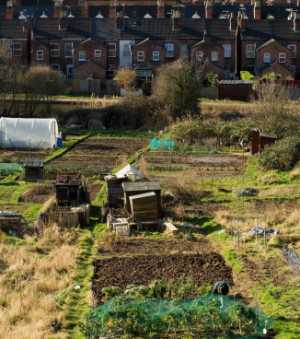Many allotment sites suffer from vandalism and theft. Sometimes minor like the theft of pumpkins, squash etc on our site and sometimes major as has happened on sites in our area, involving smashing of glass in greenhouses, breaking into sheds and even burning down of sheds.
 This problem seems to be almost the norm in many urban areas and leads to some plotholders just giving up. Just as you will feel violated if your house is burgled, vandalism of or theft from your plot has a severe emotional impact. It’s almost worse in a way as at least you can see a reason for the burglar – he wants to take your property to make money.
This problem seems to be almost the norm in many urban areas and leads to some plotholders just giving up. Just as you will feel violated if your house is burgled, vandalism of or theft from your plot has a severe emotional impact. It’s almost worse in a way as at least you can see a reason for the burglar – he wants to take your property to make money.
The vast majority of vandalism and theft is undertaken by children, often as young as 10 if not younger. They do it out of boredom, lack of anything better to do.
Theft is not generally very profitable on an allotment site. Let’s face it, the value of stolen tomatoes or pumpkins is next to nothing. Tools like spades, which cost a packet new, are next to nothing second hand. Even rotavators have a pretty bad weight to value ratio,
How to reduce theft and vandalism on allotments?
Increased Occupancy
Increased occupancy on a site will result in more people being around and thereby deterring the culprits from coming. Since most of the problem will occur at night, when plotholders are unlikely to be around, it is only going to deter, but it will assist.
Security Fencing
Security measures such as fencing will help keep out the troublemakers. If they can’t get in they can not cause trouble. Even if they do get in, their escape route is made more difficult, which will add to the deterrent effect.
Security Lights
If mains power is available on a site, infra-red activated security lights will deter night time raiders. Who don’t want attention drawn to them. Care should be taken that the lights do not cause a nuisance to people in the locality. They will often be activated by a passing cat so alerting the neighbourhood at 4am to the presence of a tomcat is not going to make for good relations.
Security Cameras
Security cameras can offer a solution. Nowadays these are available in low-light models and infra-red with radio links to a computer that only records if movement is detected. Prominent signs warning of their presence would provide a deterrent effect. They do, to be truly effective, require somebody on the other end to call the police if necessary.
Hedges
A lower cost and ecologically more beneficial method is to plant a hedge by the boundary. Plants such as Hawthorn and Pyracantha have nasty thorns that will make getting in well nigh impossible.
Unfortunately these take up space, vegetables do not tend to do well under the rain shadow of a hedge and obviously takes years to grow to such a stage as to be effective. Once grown they will also require trimming to keep them in bounds. However, gardeners are used to doing things today for which the benefits will not be apparent for a number of years.
On the plus side they increase biodiversity and provide food for birds, shelter for pest predators etc.
Social Inclusion
If the local community is aware of an allotment site, considers it of value and has some sense of ownership then they are more likely to dissuade children from undertaking acts of vandalism against the allotment and to report unusual happenings on the site.
If the children themselves appreciate the allotment site and know the plot holders then they are less likely to want to cause trouble. Better still, if they actually have a plot themselves they will discourage their compatriots from causing trouble.
Events such as open days and offering tours to the local community help in these aims. Donations of surplus produce or other services to a community will assist as well.
On one of our sites there was a wonderful organisation that enabled children to share a plot and provided help and guidance to them. The Brookhouse Urban Garden Scheme or BUGS , founded in 2002 by Susie Mitchell, gave youngsters lifelong learning skills; primarily in the art of growing plants and also teaches them to have respect for the environment around them.
Although their allotment site suffers quite high levels of vandalism and theft at present, the question is ‘how much would they have suffered without the positive effects engendered by BUGS?’ Bugs has sadly finished now as far as I know.
Allotment Information
- Allotment & Garden Paths
- Allotment Growing as You Get Older
- Allotment History – A Brief History of Allotments in the UK
- Allotment History – Cultivating a 19th Century Allotment by Dr Lesley Acton MA Ph.D
- Allotment History – The First Allotments by Dr Lesley Acton MA Ph.D
- Allotment Journey – A Step to Sustainable Living
- Allotment Regeneration – Case Study
- Allotments & Children
- Allotments & The Law – Legal Aspects of An Allotment
- Allotments – Some Tips to Get You Started
- Clearing a New Allotment or Vegetable Plot
- Cuban Vegetable Growing Practices can Benefit your Allotments
- Finding an Allotment – How to Find an Allotment
- Health and Safety in the Allotment & Garden
- Here is How Having and Maintaining a Back Garden Allotment Could Help You to Sell Your Home
- How to Ensure the Security of your Allotment
- How To Pick The Right Shed For Your Allotment
- How to reduce the costs of running your allotment
- Improving Security on Allotments to combat Vandalism and Theft
- The Allotment – The City Dwellers bit of Country
- Vacant Allotment Plots – What To Do With Them?
- Why People Grow Our Own – Our Plots
- You Have a New Allotment!



